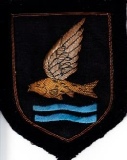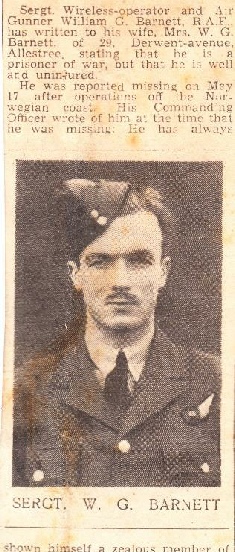To drop their torpedo they had to reduce speed and descend to about 40ft above the sea. Doing so made them ‘sitting ducks’ as it was a clear day.
Birch feathered the propeller (rotating the blades to reduce drag and improve gliding ability) on the damaged engine, dropped his torpedo and managed to turn the plane towards the sea. At this point they were forced to belly land in the water a few hundred yards from Prinz Eugen.
The landing was very successful and the four crew members clambered onto a wing with Bill returning to release two homing pigeons which were part of their distress aid package.
The emergency life-raft would not release and they could not reach the life-jackets.
Sid, who could not swim a stroke, walked calmly off the end of the wing and the others
followed him. As the air attack went on Bill, with Birch’s help, kept Sid afloat as
they watched their plane sink nose first after only minutes. At that time of year
the water temperature near Lista is less than 10oC so hypothermia would have set
in very quickly.
A German Flying Boat flew over them so they ducked, expecting a machine gun volley.
They would learn later that he was identifying their position for the German destroyer
to pick them up.
With the RAF attack and German defence still carrying on above and around them –
a newspaper article at the time quoted a pilot involved as saying that the British
and German aircraft presence was swarming "like flies around a jam pot" – they remained
in the water for about a quarter of an hour until the destroyer took them on board.
A sailor threw down a rope which was attached to Sid’s waist and he was hauled up.
No more than seconds had passed following the removal of the rope, when he overbalanced
and fell back into the water. Bill, who was both freezing and exhausted himself,
had to swim to where his best buddy was floundering and once again attach the rope
to his waist so he could be hauled, this time successfully (with the aid of a boat
hook), onto the deck.
The others held onto boat hooks and were pulled up as they were too fatigued to climb
the ladder that was lowered for them.
They were the first prisoners the ship had taken and so were regarded as quite a
novelty. The
ship’s crew stole souvenirs, such as uniform badges, but generally treated them well,
providing
Schnapps and German bread. After a very thorough stripped medical examination by
a doctor
who had trained at Cambridge University, they were led to a warm room where they
were first
wrapped in blankets and then left alone for some time to give them a chance to recover
from their
ordeal. Sid later recalled to his son that once dried off, warmed up and re-clothed,
the German crew
kept offering fruit from a bowl. They waived this away as they were intent on talking
over the events
but the Germans couldn’t understand the refusal.
This was the first wartime propaganda they were to encounter; their captors had been
convinced that Britain was on its knees and that fresh fruit was a rare luxury.
The destroyer took the captured crew to Christiansands where, after one night, they
were
sent to Oslo by train and then flown to Berlin. From there they were sent by train
to a transit camp for captured RAF personnel within the Prisoner of War camp Stalag
Luft III at Sagan in Eastern Germany (now Żagań in Poland), 100 miles south-east
of Berlin. Arriving on 25th May, 11 days after being shot down, Bill became Luft
PoW number 792.

 PAGE 5
PAGE 5